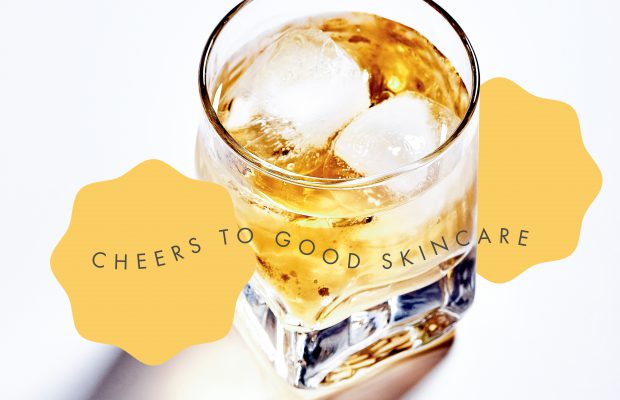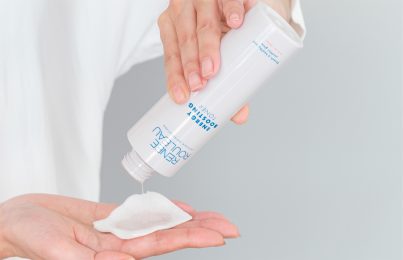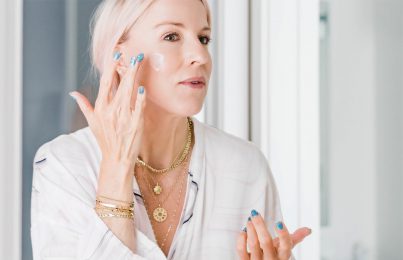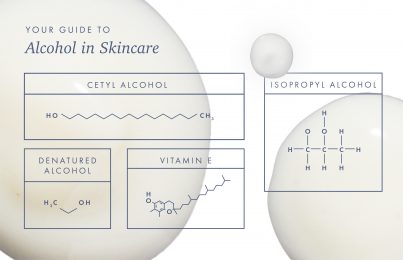Updated 12/21/21. It should be encouraging to hear that you have a lot of control over how slowly and gracefully you age. While genetics do play a role in aging (about 25%), the lifestyle choices you make play a much greater role. Things like a healthy diet, diligent sunscreen use, and more, make a major difference over the course of a lifetime. Another lifestyle choice that many people might not consider is alcohol, and more specifically, how much alcohol you consume on a daily or weekly basis. Keep scrolling to learn how drinking alcohol affects the skin.
How Drinking Alcohol Affects the Skin and Body
1. It Can Cause Blemishes
This is one of alcohol’s main effects on the skin. Here’s what happens. Since it can have a depressive effect on the nervous system, alcohol can negatively impact the adrenal glands, and a condition called ‘adrenal fatigue’ is thought to be a possible contributor to adult hormonal acne. In addition, alcohol can cause puffiness in the skin. This puts pressure on the pores, which creates a narrower pore lining. This can lead to dead skin cells and oil getting trapped in the pores, potentially triggering the start of the blemish cycle.
Rapid Response Detox Masque is my go-to product for disrupting the blemish cycle. It’s formulated with a combination of tea tree oil, salicylic acid, and sodium hyaluronate. Together, these ingredients help to improve skin clarity.
2. It Can Create Redness in the Skin and Cause Capillary Fragility
Drinking alcohol can inflame tissue and trigger a histamine response. As a result, the skin reddens and becomes warm to the touch. In the process, blood vessels that deliver blood to the face dilate (or widen). While these vessels can constrict once the skin cools down, this back-and-forth eventually causes them to lose their elasticity. This, then, leaves vessels permanently widened, resulting in the appearance of broken capillaries under the skin. These are usually most visible around the nose and cheeks and, in fair skin tones especially, can even create the look of a moderate sunburn. If you already have rosacea, this process can exacerbate your condition.
3. It Can Cause Your Skin to Age Faster
This is another one of alcohol’s negative effects on the skin. If you overconsume alcohol, it can cause chronic inflammation and free radical activity. This gradually wears on connective tissues. The result? The appearance of loose, sagging skin.
Not only that, but alcohol depletes essential vitamins from both the skin and the body. This prevents oxygen and nutrients from being properly delivered to cells. One of the nutrients that alcohol reduces is vitamin A, and more specifically, dermal carotenoids. These are powerful antioxidants that help support collagen and elastin, as well as the regeneration of new cells.
4. It Can Cause Severe Dehydration in the Skin
Did you know dryness and dehydration are totally different? Dryness means your skin is experiencing a lack of oil. Dehydration means your skin is experiencing a lack of water. This is an important distinction to make, as they each need to be addressed differently!
Water is what keeps the skin looking plump and minimizes the appearance of lines and wrinkles. When your skin is dehydrated, like after drinking too much alcohol, it can feel tight, look shiny, and show triangular fine lines. The good news is that this is a temporary condition. In other words, it’s easy to fix. You just need to restore your skin’s water levels by using hydrating products, like the Skin Drink Concentrate.
5. It Can Make the Skin Look Puffy
One of alcohol’s effects on the skin is as a diuretic. This leads to dehydration and tells your body to hold on to more water weight, causing the face to look puffy and your clothes to fit tighter. (Read up on why your eyes look puffy and what you can do about it.)
The Bottom Line
As you can see, alcohol’s effects on the skin are varied (and generally negative). However, it’s the amount and frequency of your drinking that really matters. There is some research that shows alcohol in moderation has some health benefits. In fact, in one study, researchers looked at the skin of identical twins and assessed their lifestyles. They noted that the twin who consumed more alcohol had less photodamage on their skin. Now, this doesn’t mean you should make it a point to drink more, but if you’re going to drink something, why not grab a glass of red wine? It contains resveratrol, which is an antioxidant that helps increase the “good” kind of cholesterol (HDL).
The journey to maintain healthy and youthful-looking skin is all about the good choices you make. Smart habits include wearing a generous layer of sunscreen daily, limiting your time outdoors, wearing UV protective clothing, getting adequate sleep, eating a diet rich in nutrients, and maintaining a healthy balance in the amount of alcohol you consume. These will all have an impact beyond your genetic predisposition.
Next, learn how to care for your skin when you’re beyond hungover and dehydrated.
Celebrity Esthetician & Skincare Expert
As an esthetician trained in cosmetic chemistry, Renée Rouleau has spent 30 years researching skin, educating her audience, and building an award-winning line of products. Her hands-on experience as an esthetician and trusted skin care expert has created a real-world solution — products that are formulated for nine different types of skin so your face will get exactly what it needs to look and feel its best. Trusted by celebrities, editors, bloggers, and skincare obsessives around the globe, her vast real-world knowledge and constant research are why Marie Claire calls her “the most passionate skin practitioner we know.”



